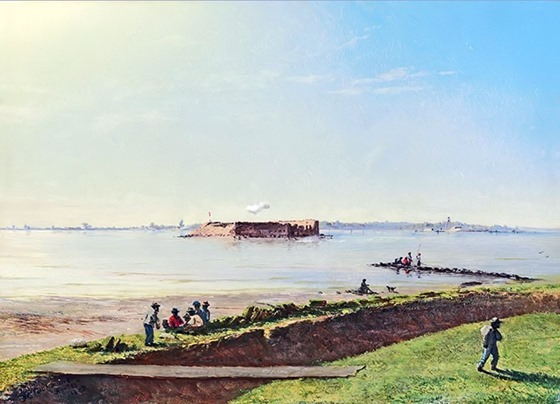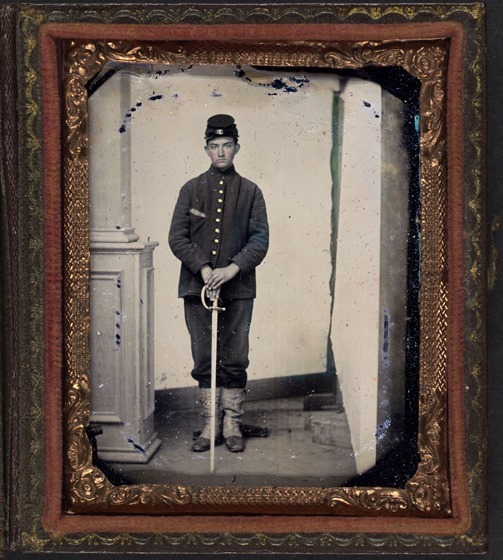Tuesday; 10th—Came out with Clan Blakemore and Fuget to Mr. Thomas. I spent the night at John Hatchers. Miss Jane Simpson was there to-night. James Pickel was not with me; the other boys went back to town.
Sunday, November 10, 2013
Lenoir, November 10th, 1863.
No sooner was the order to build winter quarters given than the men scattered in all directions in search of material. There are many forsaken buildings in this vicinity. These were visited, the siding ripped off, floors torn up, chimneys, if brick, pulled down, and the material appropriated. Hundreds of men worked all night, and by morning had lumber enough to build bunks, floors and gable ends to their buildings. The reason of this all-night work was to get the start of the officers. They knew, by past experience, all building material would soon be put under guard for the use of officers. A large brick storehouse at the depot had been burned. This was seized by headquarters. Not a brick could be obtained, only as it was stolen in the night. Just the same, the boys all had brick chimneys.
Not being disposed to work nights or Sundays, my tent mates and myself did not begin to build until Monday morning. In the forenoon we cut our logs and carried them about half a mile on our backs. In the afternoon two of us laid the foundations, while the other two went with the Sutler’s team for a load of stone for our chimney. They also picked up a few boards. Tuesday we began to build in earnest—two at the house and two at the chimney—carrying them both up together. At night it was ready for the roof. Wednesday we “chunked and daubed” it, and put on the roof, built our bunks, and, toward night, moved in. Thursday we finished the chimney, put up shelves, etc. We have a warm, comfortable house, seven logs high, roofed with two thicknesses of tent cloth, which makes a very good roof. Our bunk is in one end, and occupies four feet across it, leaving a room six feet by eight. We have a splendid fireplace —back and jambs of stone, the top of sticks. In one corner are shelves for our dishes. On one side of the room is a drop table, which we button to the wall when not in use. Our bunk is not made of poles, rough and crooked, like those of last winter, but of pine boards, soft and luxurious.
On Thursday we had regimental inspection of arms. I told the boys I heard “music in the air,” but they could not believe it. It was there, however. About 10 o’clock in the evening Captain Tyler came to our tent and called for me. He told me to wake the boys and tell them to pack their things and be ready to take cars in half an hour for Knoxville. Here was a fix—to leave our soft beds and warm houses, our winter quarters, and go out into the cold— it was bitter cold—to ride on the top of cars twenty, perhaps seventy-five miles, and sleep—if sleep we might—on the cold, damp ground, and march twenty or thirty miles a day on half rations. But away we went, the Third Brigade only, to the station. It was 2 o’clock in the morning before the cars were ready, and we reached Knoxville a little after sunrise. Here we learned the cause of the movement. The Rebels had made a dash on Wilcox, near Greenville, capturing a section of the Second Ohio Battery and part of the Second Tennessee Mounted Infantry. Not knowing their strength, we were ordered to be within supporting distance while a force of cavalry was sent out to reconnoitre. We drew full rations of soft bread and beef, and lay on the cars, the engine keeping up steam until about 4 p. m. We then encamped for the night . Next morning we again drew rations, packed our things and awaited orders with impatience. But no orders came, and there we lay and waited all that livelong day.
10th. Had little or nothing to do. Went up to see Commissary on business. Absent. Went out to Mr. Lynch’s to see a horse. Learned he had sold it and returned to camp. Left detail for Thede, June, Lewis Emmons and Dan Coats. Night before received letter from Lucy Randall—married.
Tuesday, 10th—I was on a detail of two hundred men with one hundred teams to haul the commissary supplies and ammunition from the transports to the storehouses and magazines constructed near the new forts. It is heavy work, and as to handling the ammunition, quite dangerous. General Grant has given orders that Vicksburg must be well fortified and supplied with munitions and provisions, and that it must be held against all possible attack, for it cost too much to obtain it, besides its being a point of the greatest strategic importance.
November 10 — This morning we forded the Rapidan at Rapidan Station, then moved in an easterly direction all day toward Fredericksburg. We marched on the old Fredericksburg pike, now a very rough road; at dusk this evening we struck the Orange plank road, about eighteen miles east of Orange Court House, and camped. The weather is very cold.
Camp in Oak Barrens, Tenn., Tuesday, Nov. 10. Prepared for an early march. Moved at 9 A. M. as we had to wait for the 2nd Brigade to move ahead. Passed through town, which is an old fashioned place of quite a size. Looks as though it was the same twenty years ago. Of course it was perfectly dead, no sign of trade or purchase of any kind. Crossed Elk River two miles from the town on the best bridge I ever saw. It is built of solid stone all hewed, five arches, with a foot path on top of each side wall. It is but a single track erected in 1861. Poor country! After we left the river valley, nearly deserted fields lie idle. About noon we entered the Oak Barrens, so called from its sterility. It is a perfectly flat tract of land with a yellow clay soil. Oak openings, no underbrush, the oak not very large. It lies lower than the surrounding country and covered with pond holes which we rendered bottomless with a little travel, the wheels cut down so. No houses or fields to be seen. Went into camp in the first field we saw for five miles, and that was deserted. 4th Platoon wheel horse fell dead tonight before it came to camp. He was the biggest and best horse of the Battery, supposed to be overdone. Train of cars passed out on the Fayetteville branch loaded with crackers for our camp. It was escorted by two regiments of Slocum’s Corps, the New York and Pennsylvania regiments. Mail received. I got letter from home of the 25th ult, so we are once more approaching the Union lines. No news or paper seen save wild camp rumors which are conflicting. No corn to feed our horses to-night. I am on guard.
November 10th. A slight fall of snow during the night, the first of the season, which suggests a cessation of campaigning; at 3 P. M. the first division was ordered to encamp on the south side of Mountain Run and put up winter quarters. The order was received with unbounded satisfaction, as the season is late, the weather cold and the troops pretty well tired out. Division headquarters in the Hamilton house.
Painting by Conrad Wise Chapman.
“This is a view of Fort Sumter from Fort Moultrie; shows also battery on James Island. A shell is bursting over Fort Sumter. The artist stated he never looked in the direction of Fort Sumter that he did not see a shell bursting over it.” – Conrad Wise Chapman, 1898
Unidentified young soldier in Union sack coat, forage cap, and white gaiters with sword.
__________
Ninth-plate ambrotype, hand-colored ; 7.2 x 6.2 cm (case)
Liljenquist Family Collection of Civil War Photographs; Ambrotype/Tintype photograph filing series; Library of Congress Prints and Photographs Division.
Record page for image is here.
__________
 Note – This image has been digitally adjusted for one or more of the following:
Note – This image has been digitally adjusted for one or more of the following:
- fade correction,
- color, contrast, and/or saturation enhancement
- selected spot and/or scratch removal
- cropped for composition and/or to accentuate subject matter
- straighten image
Civil War Portrait 089
by John Beauchamp Jones
NOVEMBER 10TH.—It is supposed our loss in the surprise on Saturday did not exceed 1500, killed, wounded, and taken. It is thought that a battle will occur immediately, if it be not already in progress.
There is no news of moment from any quarter, except the loss of our steamer Cornubia, taken by the blockaders at Wilmington. She was laden with government stores. For months nearly all ships with arms or ammunition have been taken, while those having merchandise on board get in safely. These bribe their way through!
Col. Gorgas gave notice to-day that our supply of saltpeter will be exhausted in January, unless we can import a large quantity.
Another blue day!











